“National Anthem” by Lana Del Rey as a Commentary on American Nationalism and Political Structures
Nostalgic art and culture have been on the rise since the 2010s. Fashion, music, television and film, and more have been making a comeback or being revamped to fit the current day and age. For instance, Downton Abbey and Bridgerton are examples of period pieces that are nostalgic for the British high society of the 19th and early 20th centuries. Stranger Things is bringing back ’80s nostalgia. Classis ’90s shows like Full House, Boy Meets World, and Beverly Hill 90210 have been getting reboots and ’90s bands like the Backstreet Boys and the Spice Girls are active again. Olivia Rodrigo is bringing back Y2K fashion and aesthetics. These are just some examples of how active nostalgic art and culture have been in the last decade or so. An artist that has played a large role in the rise of nostalgic art and culture is Lana Del Rey.
Who is Lana Del Rey?
Lana Del Rey is an American singer-songwriter who rose to prominence in popular music and culture in 2012, following the release of her second album entitled Born to Die. Del Rey has remained an influential icon in the years following Born to Die and has released six highly successful albums since. She is known for her highly stylized musical genres and fashion sense, in which she references and emulates popular American culture and fashion from the 1950s-1970s. She also effectively fuses different genres of music to create a modern kind of alternative music with pop and rock influences. Del Rey’s music is known for its themes of glamour, tragic romance, nostalgia, and melancholy, along with motifs of American nationalism.
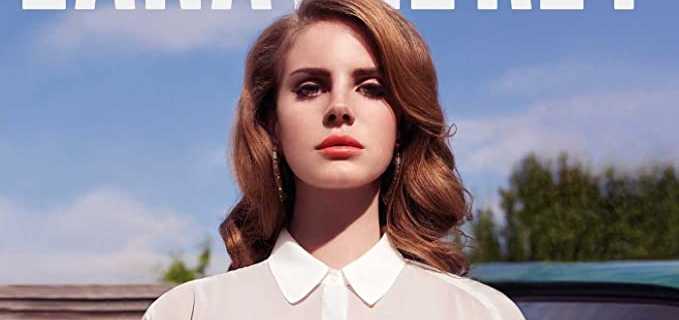
Longing for the ’60s
One song and music video by Del Rey, in particular, embodies this nostalgic longing. The music video for “National Anthem” by Lana Del Rey, shows a deep appreciation for American culture and history, particularly the 1960s, while also providing a subtle critique of the sociopolitical systems that form America. The works of Svetlana Boym and Audre Lorde can be used to explore how the lyrics and music video for “National Anthem” by Lana Del Rey use reflective nostalgia under the guise of restorative nostalgia to examine the neoliberal capitalist ideologies and institutions embedded in American history and societal infrastructures and expose it for its exclusivity and ineffectiveness.
Nostalgia: Restorative and Reflective
The presence of the aforementioned themes and motifs in Del Rey’s music offer a subtle commentary on American neoliberal capitalism and its effects. The concepts of restorative and reflective nostalgia, as outlined by Svetlana Boym in Nostalgia and its Discontents, help explain Del Rey’s frequent use of nostalgic themes in her music. Restorative nostalgia “…stresses nostos (home) and attempts a transhistorical reconstruction of the lost home” (Boym 13), meaning that this type of nostalgia longs for a time and place that no longer exist, and attempts to recreate it, through ideology and/or aesthetics. Reflective nostalgia “…thrives on algia (the longing itself) and delays the homecoming–wistfully, ironically, desperately” (Boym 13), meaning that this type of nostalgia also misses a time and place, but looks at it critically and questions the ambivalences that are intrinsic to the time, and does not attempt to recreate it. While both can overlap, they differ in their self-perception; “restorative nostalgia does not think of itself as nostalgia, but rather as truth and tradition” (Boym 13), while “reflective nostalgia dwells on the ambivalences of human longing and belonging and does not shy away from the contradictions of modernity” (Boym 13). “National Anthem” uses restorative nostalgia of the 1960s and the allure and glamour of JFK and his wife, Jacqueline ‘Jackie’ Kennedy’s life, while exposing the inequalities and difficulties they faced as public figures which uses reflective nostalgia.
Significance of Casting Choice
The music video opens with a black and white reenactment of Marilyn Monroe’s infamous “Happy Birthday Mr. President” performance from 1962. Del Rey sings the song exactly as Monroe sang it, but is not dressed to look like her. This sets up the scene for familiar historical events, with obvious and intentional allusions, but a modern spin on the key figures. This is further seen when Del Rey finishes her happy birthday rendition and the screen shows American rapper A$AP Rocky in the role of President John F. Kennedy (JFK). Before Del Rey even starts singing “National Anthem,” the longing for 1960s American culture and glamour is evident. The rest of the music video shows glamorized and romanticized glimpses of JFK and Jackie’s time in office and his assassination, portrayed by A$AP Rocky and Lana Del Rey, respectively.
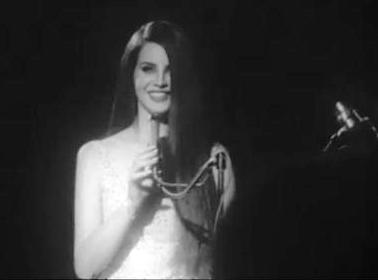
The decision to cast A$AP Rocky as JFK is also noteworthy because JFK was a white man and A$AP Rocky is a Black man. The music video for “National Anthem” was released in September of 2012. At this point in time, Barack Obama, America’s first Black president had just finished his first term in office and was running for reelection. Obama’s time as president and A$AP Rocky’s portrayal of a famous white president echo the sentiments brought forth by Audre Lorde. Lorde says, “For the master’s tools will never dismantle the master’s house. They may allow us to temporarily beat him at his own game, but they will never enable us to bring about genuine change” (2). By having a Black person as president, it may seem like substantial reparations and changes could be brought forth for marginalized groups of people, but the political system is fueled by neoliberal capitalist ideology and thus can never truly help those disenfranchised by the same system. In other words, having a Black president does not change the problematic system of which he is made the head. Similarly, having a Black man play JFK does not change the fact that JFK was still assassinated. Restorative and reflective nostalgia cannot change the past, but the latter can encourage improvement.
Visual Aesthetics
Unlike the opening scene, the rest of the video is in colour and appears to be shot with a vintage camera or filter. This serves the aesthetic function of restorative nostalgia, as the appearance of utilizing film technology from the 60s lends to the longing for that era. The aesthetics are also supplied by the clothing, makeup, and hairstyles. However, despite using the format of 60s film technology, it is deliberately very clear and not grainy. This is how the music video visually employs reflective nostalgia, as it appreciates the art form of the time but acknowledges that the quality was not good and thus uses modern quality standards. This is also applicable to the fashion included in the music video, which pays homage to the clothing, makeup, and hairstyles of the period but incorporates them in modern ways; for example, Del Rey’s nail polish designs are modern, as well as showing A$AP Rocky’s box braids (which would have been deemed unprofessional in the 60s).
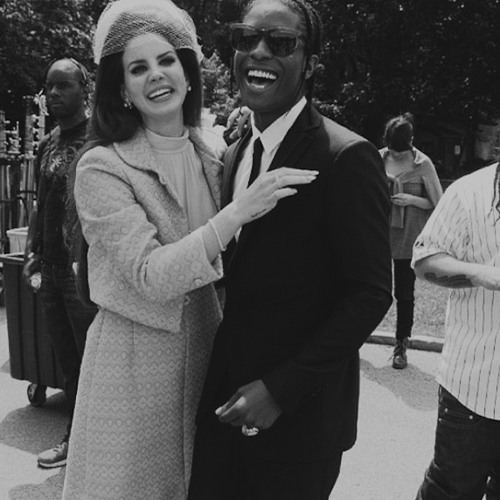
Highlighting Materialistic Culture
Having discussed the visual aesthetics of the music video as restorative and reflective nostalgia, the lyrics of “National Anthem,” can be explored as they offer more insight into the reflective nostalgic critiques of neoliberal capitalist ideologies and systemic racism. As indicated by the title of the song, the lyrics discuss what the national (American) anthem represents. The song begins with “Money is the anthem of success,” which is repeated throughout the song, and is the opening and closing lines of the track. The emphasis on the importance of capitalism and wealth accumulation is present throughout the song and can be seen as a metaphor for how pervasive capitalism is throughout our lives. After the first instance of “Money is the anthem of success,” the lyrics continue, “So before we go out, what’s your address?” Here Del Rey is asking her potential lover whether he lives in a rich neighbourhood and whether he can sustain an expensive relationship. The national anthem of America is a source of pride and patriotism for many American citizens and is supposed to encompass everything the American Dream has to offer.
When Del Rey says, “I’m your national anthem” or “Tell me I’m your national anthem” throughout the song, she is talking about how America has come to represent and value materialism, and that serving her materialistic desires is how her lover can appreciate her the way that Americans engage with capitalism to show their love for their country. She goes on to say, “Take me to the Hamptons, Bugatti Veyron,” by which she is asking her lover to take her to a notoriously exclusive neighbourhood for rich families in an expensive sports car. Here Del Rey emphasizes a materialistic and superficial culture fueled by neoliberal capitalism. In the chorus, Del Rey says, “Red, white, blue’s in the sky / Summer’s in the air and, baby, heaven’s in your eyes,” which talks about the materialism that represents America and how her lover’s ability to fuel these materialistic needs are what draws her to him. In the bridge, Del Rey says, “We’re on a quick, sick rampage / Wining and dining, drinking and driving / Excessive buying, overdose and dying,” by which she emphasizes the abundance of wealth causes reckless behaviour. Here the wealth inequalities in which the lower and middle class continue to suffer and struggle and the upper class continue to get richer are emphasized by saying that the rich have so much money that they spend frivolously and are unable to cope with the overwhelming demands of a wealthy lifestyle.
The music video for “National Anthem” by Lana Del Rey is charged with restorative nostalgia that is actually reflective nostalgia and brings to the forefront the ineffectiveness of neoliberal capitalism and its place in American nationalism. The visuals and aesthetics of the music video are restoratively nostalgic, with subtle reflective nostalgic characteristics. The entirety of the song discusses the life of the elite and rich, and how on the surface this may seem desirable (restorative nostalgia) but, upon closer look, actually proves to be detrimental to the health and well-being of these people (reflective nostalgia). The lyrics and the video for Del Rey’s fifth single off her Born to Die album is a commentary on the stronghold that neoliberal ideology, capitalism, and racist political structures have on America and how they cannot be dismantled within the current systems of power in place.
Works Cited
Boym, Svetlana. The Future of Nostalgia (New York, NY: Basic Books, 2001).
Lorde, Audre. “The Master’s Tools Will Never Dismantle The Master’s House,” in Sister Outsider: Essays and Speeches (Berkeley, CA: Crossing Press, 1984)
What do you think? Leave a comment.



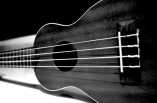

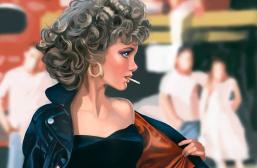

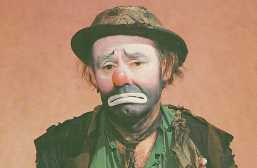


She really is a fantastic pop writer.
My daughter is, some may say, obsessed with Lana so I hear her songs a lot (she plays her music loud which is encouraged). The one which really stands out for me is “Salvatore”. Very different to the rest of her songs.
My daughter is obsessed too (age 15)
I’m working at her desk in her room now and tempted to put on NFR as she has it on vinyl, to see what all the fuss is about
Do it! Fantastic album from start to finish.
Truly it is LDR’s world and we just live in it.
A once in a generation talent who stands head and shoulders above her contemporaries.
I like her but all her albums and songs tend to merge into one for me. I like hearing individual songs at random rather than entire albums. I wish she’d try to do something radically different from what she’s done so far.
She has the name, the 50’s aesthetic, the music, the voice, and the lyrics that really invoke the lost/failed dreams of hopeful starlets in the mysterious canyons of Hollywood.
Great comment and article, totally agree.
Those lyrics are absolutely dire.
I like her image and I think it’d be so great if she really was playing a character.
But really, you have to have the tunes to back it all up, and there is no excuse ever for bad lyrics – lyrics are what people latch on to – to enjoy or identify with or whatever – so it’s a real pity. I was hoping she would be great, alas.
They’re nice songs designed to create a certain atmosphere, just enjoy it for what it is. I rarely listen to lyrics anyway, if you want deep and meaningful, read a book. In music they are just a part of the bigger picture.
She often receives hate.
She’s got a great voice, and the songs are very enjoyable.
That’s all that matters. The shrieks of inauthenticity and people trying to find stories to write about her who then complain that she’s being pushed too much are tiresome.
Never had much interest in Lana Del Rey but great job with the article.
Had a couple of spins of the album last night and thought it was a bit meh, most of the tracks like lesser versions of the singles or crappy r’n’b/hip-hoppy stuff. Maybe it’ll grow.
I’m probably not what one would consider a pop music fan – my favourite artist is, by far, Syd Barrett, and fave bands are Pink Floyd (especially from ‘Piper’ to ‘Animals’) and Soft Machine, so there’s that.
However, I’ve listened to this album for the first time 3 days ago and I’ve been playing it over and over ever since. Wonderfully constructed pop, with a Lynchian California-noir feel to it; and while the lyrics aren’t exactly what one would consider deep, they perfectly accomplish their purpose – giving us the perspective of a jaded but somewhat superficial California girl. She’s been playing with stereotypes from the beginning, and the lyrics are a continuation of that. So I definitely don’t think one should ignore the lyrics – they’re as important to the whole ambiance of the album as every other musical element – but one should definitely know what to expect. I don’t think it would be coherent (and this is only my opinion) for an album like this to take itself too seriously, as far as lyrical themes are concerned. LDR – the music, the persona, the videos – it’s all about the imagery, and the feelings of nostalgia and longing she tries to convey.
That being said, I’m not sure most men will be able to appreciate this album as much as women (and I say this from a female point of view). I can’t quite explain why, that’s just my impression; there’s something quintessentially feminine about it I’m not sure many men will be able to relate to.
She not an artist for the people or for the kids, she’s an artist for music journalists.
This is pop. It is about fantasy, dreams of old Hollywood – sure, there is much cliché there, but this is pantomime is it not? Deliberate or not she is a product of American add-mass culture – it is escapism – and this is where it works (she may even be aware of this).
The fact that so many people are talking about her is testament to how strong her voice, music and image is – I think this is irrefutable.
I quite like her songs. There is no doubt that she has had a lot of backing and all that but that is neither here nor there. What I find interesting is the lengths they’ve gone to for her to be seen to be “Lana Del Rey.” She’s hinted at having a bit of a troubled past, not in wealth stakes of course, but other ways maybe. So the more intriguing story for me, considering the money her dad has put into her career.
I like her music and her image. The noir style is different and haunting, great for a dinner party fuelled by fabulous drinks. She definitely has a great voice.
She’s got something that’s making her stand out from the rest and that’s what it’s all about isn’t it. She can sing, has a memorable and distinctive image that doesn’t involve showing lots of flesh, she’s got the killer track.
I only discovered Lana Del Rey recently. She’s made 3 stunningly beautiful songs which easily compare with my other favourites from PJ Harvey, Beth Gibbons and Kate Bush.
I believe, is that her recorded music is beautifully performed, whereas live she is a nervous wreck.
I love her music (Hope Sandoval, from Mazzy Star, has a similar lethargic though beautiful vocal style).
Thank you for your commentary on this song. It offers insight into what Del Rey’s thinking might have been when writing this song and creating this video. I think she is trying to provide criticisms about our society today, which you had suggested. By placing it in the era of JFK she may be trying to communicate that this is when the meaning of the national anthem started to change. We are familiar with the real National Anthem and I believe that Del Rey is trying to say that we have moved so far away from the real one and what it is supposed to be, that it no longer represents our country. Rather, there is a new sort of anthem that represents our country and the values of today and she provides a possibility of what that new anthem may be with the new values that she sees we hold more dear to us than in the past.
The lyrics derail the album for me, it shows that she is reaching for something she can’t quite pull off. If the melodies are the work of producers, and the lyrics are crap, what does this artist have other than a very stylish image that is conveyed over and over again? The stereotyped image of the Gaze-embracing female waiting for her man to come along and tell her who she is…even the arrangements and beats have a “canned” feeling about them, they are signifiers, not really specific in and of themselves.
I like how the voice really is at the forefront of things, and I like how she (or the producers?) built a sense of drama in the songs structures. They’re all quite melodramatic in design, but sort of mindlessly executed. Almost as if they’ve found the winning formula and stopped there. I’m glad they are not pretending it’s some sort of deep record.
Born to Die is my favourite song on the album.
That video games song has been really annoying me as it reminds me of something else, far better, but i couldn’t remember what it was.
Lana Del Ray only appeared on my radar when I heard the title track of this album in my car a couple of weeks ago.
DR is the only current artist whose releases excite me at all. I find listening to her like a head massage, it’s non-taxing & good to do while having a beer, or driving, photoshopping, cleaning, reading – anything really.
I wish I did like all the other music & found it moving or engaging, but I don’t. Similar to the TV dancing shows, or bakery contests that move the nation – they do nothing for me except make me slightly more misanthropic. Well, that’s my two-bobs worth, hardly enlighting or worth posting but being as it’s free I thought I might as well.
I was going to pen my own summation but I feel like this covers it.
Just remembered my first exposure to LDR was her demo of Lolita. It’s just a staggering piece of pop – perfectly constructed like an ABBA song with hook after hook after hook.
Interesting how this author compares restorative and reflective nostalgia. The accumulation of wealth leads to reckless behaviour in America; JFK as a black man, represented in Lana Del Rey’s video, “National Anthem,” shows how culture and society in America have changed, but the underlying power structure of the rich and powerful remains.
She’s an amazing talent and I think the album underplays her potential by pandering to a more mainstream sound.
I think she’s pretty awesome, I’ve been listening to her pieces on youtube for months now and will certainly buy the album.
For me, her songs and style are a mix of 60s-esque cocktail-bar glamour and little-girl vulnerability, sad and sweet.
The only song by Lana del Ray that I’ve heard is “Video Games”. I don’t think it has a strong melody at all. It just meanders from start to finsh without ever getting anywhere. It’s basically a heavily-produced style-exercise.
Perhaps her other stuff is better. I admit I haven’t heard it.
Why hasn’t anyone noticed that she sounds like the Sneaker Pimps from the mid nineties? Albeit a slightly watered down version (if that’s even possible!).
Video Games was quite nice, but the rest of it? Not my favorite. But great analysis of the song.
To me her voice sounds like a cross between Roy Orbison and Will Young.
Incredible talent, beautiful perelson, and meticulous lyrics.
This is an interesting take, very nicely done article!
I appreciate the way the article breaks down each symbol and lyric, tying it to both the past and the present!
I’ve always been a huge LDR fan — in fact, she was my first favorite musician, the first artist I really resonated with. I find the lyricism of National Anthem pretty significant as well. Even the music video alludes to that 1960s bygone greatness.
I wish she stuck with the big production sound, some of her newer albums are weak in that department, and to be honest, I feel like they’re not saying much of anything important.
Lana is an American icon in a way that is less sexualized than Madonna, but as sexualized in that she demonstrates the patriarchial structures, that almost force this sexualization into being around men.
American “… where ‘isms’ remain/patriarchy, the way things have been, are and will be unless creative awareness emerges through a cultural ritual – like film, music, and art creation.
Lana has achieved overriding the “isms..” using creativity, and communicated it in such a way, that she’s kept her femininity, as opposed to being swallowed alive by that Jungian archetype – the Prostitute. This is the archetype that “engages lessons in the sale or negotiation of one’s integrity or spirit due to fears of physical survival or for financial gain.” (Liddle, 2021).
Lana, you should teach sociology.
I love this breakdown of the lyrics and the meaning behind it; extracting the ideologies about america
I remember seeing the video of Del Ray’s video, I just thought it was OK. The images from the Kennedy era were my childhood so perhaps I saw them differently than anyone who has no memories from this period but sees them only from the images or impressions they have now. This was a well written essay. I’ve written on the use of nostalgia, so I enjoy seeing how it is approached by other writers. I also referred to Svetlana Boym, I guess her writing gets around.
This is a really interesting take on a wonderful song. I have always thought that “National Anthem” was Lana’s best music video.
I love this song and I never even realized how much meaning was behind it!! Awesome article!
“For the master’s tools will never dismantle the master’s house. They may allow us to temporarily beat him at his own game, but they will never enable us to bring about genuine change”
Great quote!! I really enjoyed the mention of A$AP Rocky and how his presence was intentional and deeper than him just being there.
So much of Lana’s old work has these themes, but her more current work goes beyond and often freely criticises more explicitly I feel – Looking for America, or Woodstock in my Mind, for instance are openly disapproving of the prevalent social and political structures.